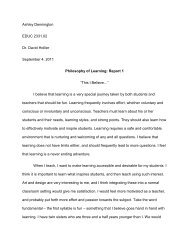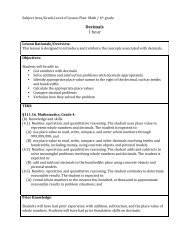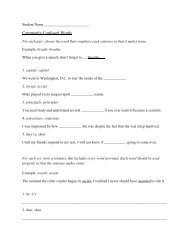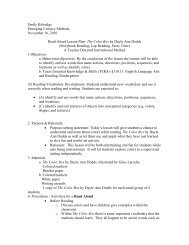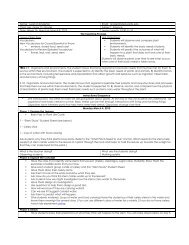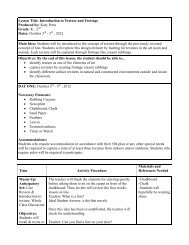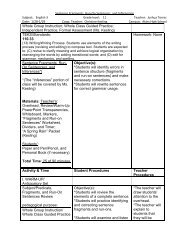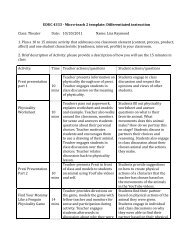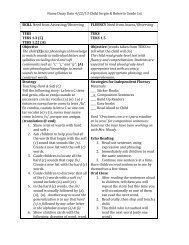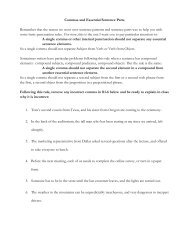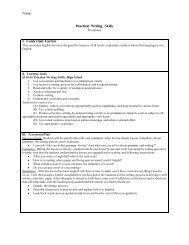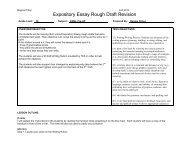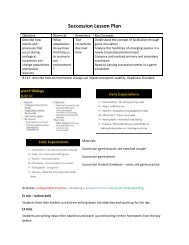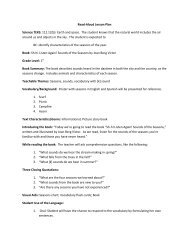Philosophy of Inclusion - St. Edwards University
Philosophy of Inclusion - St. Edwards University
Philosophy of Inclusion - St. Edwards University
Create successful ePaper yourself
Turn your PDF publications into a flip-book with our unique Google optimized e-Paper software.
Nuckols 1<br />
Courtney Nuckols<br />
Dr. Loughmiller<br />
EDUC 2324<br />
9 Sept. 2011<br />
<strong>Philosophy</strong> <strong>of</strong> <strong>Inclusion</strong><br />
I remember what it was like to feel like an outsider; to feel like my classmates and my<br />
teacher did not understand my struggle, or understand that I needed help. I remember feeling like<br />
I was drowning in my school work, and that no matter how hard I tried there was no way to get it<br />
all done. Then I was introduced into 504, where I was given special services and<br />
accommodations that enabled me to finish the year with all A’s, well except for math but math<br />
has always been a struggle for me. I know what it is like to go from feeling overwhelmed and<br />
unwanted, to feeling like I was smart and knowing that my peers would no longer make fun <strong>of</strong><br />
my struggle. When I was in high school I was also receiving accommodations, but I was an A<br />
student in every class, with an exception in math, again. I had my general education classmates,<br />
ask me for help on homework and to help them study for tests and quizzes. It was a complete<br />
turnaround from what I was used to. I was in an inclusive classroom all through grade school,<br />
even though on numerous occasions my ARD counselor wanted to move me into some special<br />
education classes; I chose to stay in regular education because I wanted to learn to interact with<br />
my peers, because I knew that when it came time for college and getting a full time job, no one<br />
was going to give me accommodations like school did. Having accommodations and staying in a<br />
regular education classroom was well worth the struggle; it taught me to be a self-advocate and<br />
to stand up for myself when I was not getting the help I needed, and that is one <strong>of</strong> the skills that I<br />
still use on a regular basis.
Nuckols 2<br />
I believe that inclusion allows both students with special needs, and regular education<br />
students to be in an environment that prepares them for social and academic situations with peers<br />
who have differing disabilities. <strong>Inclusion</strong> allows for growth in both areas because all students<br />
must learn to interact with each other, and they must interact with students who may not have<br />
been involved in the classroom or learning environment previously. I believe inclusion allows for<br />
moral growth and a growth in compassion and understanding towards the students with special<br />
needs, and it allows special needs students to feel like they fit it.<br />
I think that working in an inclusive classroom would definitely be a challenge, but it<br />
would help me to become a better teacher. I know what it is like to feel “special” inside the<br />
classroom, and to feel unwanted by my classmates and by my teacher. I think that I would be<br />
able to show some compassion and understanding to students who may not receive that from<br />
their peers, or from their environment. I think that teaching in an inclusive classroom would also<br />
help me to understand the struggles that the teachers go through when they are unprepared to<br />
have an inclusive classroom.<br />
The goals for my inclusive classroom would be to help the special needs students get a<br />
good education that will prepare them for whatever path they choose to follow after their<br />
secondary education; to provide attention and the necessary services needed to each child; to<br />
introduce all students to a better understanding <strong>of</strong> each other, and to help the students to grow<br />
socially and educationally.<br />
The benefits to teaching in an inclusive classroom would be that it allows regular<br />
education students to become familiar with their differing abilities schoolmates, and would allow<br />
for a growth in social skills and compassion for students who don’t learn as easily as others. An<br />
inclusive classroom also promotes the inclusion <strong>of</strong> all students into the learning environment and
Nuckols 3<br />
students learn that students with special needs should be, and can be, included in other social and<br />
learning environments outside <strong>of</strong> the classroom. I also think that it helps to desensitize regular<br />
education students from the stigma and mystery that <strong>of</strong>ten times surrounds children who have<br />
special needs or that are in special education. The challenges <strong>of</strong> an inclusive classroom would be<br />
incorporating material that would be digestible and interesting for both the regular education<br />
students and the students with special needs. It might also be a challenge to be able to give<br />
enough attention to each student, so that everyone has the same opportunity for help and<br />
clarification. It might also be a challenger to determine whether or not the material is suitable for<br />
the child with special needs. According to out textbook and a discussion in class, a Least<br />
Restrictive Environment (LRE) is, “to the extent appropriate, students with different disabilities<br />
are education with students without disabilities.” I have to keep in mind that I also need to make<br />
sure the special needs students are struggling with the material, because if they are frustrated it<br />
will only hinder their learning even further. Also, being a regular education teacher, it might be<br />
difficult to learn and remember the entire stratagem for teaching the students with special needs.<br />
In order to have a successful inclusive classroom, I would need to have a special<br />
education teacher that could help me learn the different ways to teach the special needs students,<br />
and also for support when I was not sure what I was doing. I would also need support from the<br />
school and its resources as far as learning labs or extra help with tutoring for the times that I am<br />
unable to help the special needs students as well as I might want to.<br />
I believe that an inclusive classroom would not only benefit the students with special<br />
needs, but would help the regular education students and the teacher to grow in their learning and<br />
social environments. I can see that inclusive classrooms have their challenges, and probably just
Nuckols 4<br />
as many bad days as good ones, but I think that the overall benefits for the students outweigh any<br />
challenges that are present.



